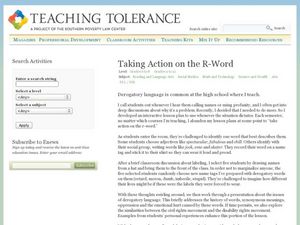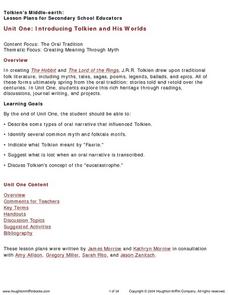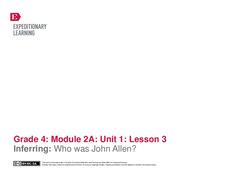Curated OER
Teaching Tolerance: Taking Action on the R-Word
Students explore the use of derogatory language and labeling others. In this discrimination lesson students research word origins, how different terms came to be used in a negative sense and what it would be like to have a negative label...
Curated OER
How is Rice Used in Food from Different Cultures?
Fifth graders examine how rice is used in different cultures. In this culture activity, 5th graders explain the similarities between dolmas and sushi, then name two different Mexican rice dishes. Students learn new vocabulary words,...
Curated OER
Riddles with Blending
Learners examine how blending sounds together helps them pronounce words. They look a flash cards with letters on them in order to blend the letter sounds together before listening to riddles that encourage them to blend letters into...
Curated OER
Word Problems
Students solve word problems using mathematical symbols. In this algebra lesson plan, students collect data and analyze it. They analyze the data using a table or graph after plotting the data.
Curated OER
Going "Diggie" with Math Word Problems
Sixth graders create word problems. In this sixth grade mathematics lesson, 6th graders use digital cameras to photograph interesting events around school and create word problems for their photographs that address the key concepts...
Curated OER
Culture Differences
Sixth graders research and collect data about different holidays celebrated in Taiwan. In groups, they discuss what they have learned and discuss differences between eastern and western culture.
Curated OER
Word Picture - Communicating Visually
Students examine how words and visual images are used to influence people. They choose a word to illustrate using both lettering and visual images. They present their work and it is critiqued by a peer review.
Curated OER
No Flaw With Newton’s 1st Law
Students explain what inertia is in their own words. In this physics lesson, students investigate how Newton's first law applies to their robot. They discuss real world examples of the 1st law.
Curated OER
Gone With The Wind
Young scholars review the different types of natural disasters. As a class, they examine how people and communities deal with weather disasters. They compare and contrast how two communities respond to a tornado or hurricane. They...
Curated OER
Abenakis Before Contact: Different Worlds Meet
Students study the lives of the Abenaki before contact with Europeans and how their lives changed after contact with the Europeans.
Curated OER
What Do We Mean by "Living Things"?
Students discuss the characteristics of life. In this living things lesson students complete a lab while working in groups. Students examine different organisms and create a poster to present to the class.
Curated OER
Introducing Tolkien and His Words
Students identify and describe the types of narratives that made Tolkien the writer he was. In groups, they examine different myths and folktale motifs. They discuss what Tolkien meant by "faerie" and "eucatastrophe." As a class, they...
Curated OER
Reading Articles for Meaning
Third graders read and analyze an article. For this interpretation and summarizing lesson, 3rd graders listen to an article and identify the who, what, where, when and why of the article. Students pick their own article, switch with a...
Curated OER
Wacky Word Play
Students investigate word and picture puzzle techniques. They complete and create word and picture puzzles.
Curated OER
Leveled Problem Solving Mean, Median, and Mode
In this mean, mode, and median activity, students solve the word problems by finding the mean, median, and mode. Students solve six word problems.
Curated OER
Vocabulary Practice: Similar Meanings
In this vocabulary learning exercise, students read a sentence, then circle the letter of the sentence beneath out of 3 that means the same as the first.
Curated OER
Emlyndo Word Search Puzzle
For this literacy worksheet, students look for the words in the puzzle that are related to the theme of the word search. The vocabulary and spelling are emphasized.
Curated OER
Introduction to Watsonville Wetlands
Identify the different plants and animals found in wetlands, your class will explain the importance of wetland ecosystem and locate the different wetlands in their area.
Curated OER
What Are the Advantages and Disadvantages of Conforming?
Dive into Arthur Miller’s The Crucible and determine what it means to conform in society, and discuss as a group with the thoughts and plans available in these documents. Included are multiple activities and brain targets that form the...
University Interscholastic League
English Lesson to Prepare for UIL Spelling and Vocabulary Contest
"i before e. . ." Spelling is easier if kids know the eight basic spelling rules contained in this resource packet.
English To Go
Countable and Uncountable Nouns
What is a countable noun, and how can you identify one? Read through this sheet with your English language learners. Lots of helpful questions are included to help your class identify which nouns are countable and which are not. Then,...
EngageNY
Inferring: Who was John Allen?
Help your learners work with difficult or archaic words. A continuation of lesson two of this module, the plan here focuses on deciphering the Inventory of John Allen, in particular the unfamiliar words that make up much of the list. Add...
Statistics Education Web
Did I Trap the Median?
One of the key questions in statistics is whether the results are good enough. Use an activity to help pupils understand the importance of sample size and the effect it has on variability. Groups collect their own sample data and compare...
EngageNY
Normal Distributions (part 1)
Don't allow your pupils to become outliers! As learners examine normal distributions by calculating z-scores, they compare outcomes by analyzing the z-scores for each.

























